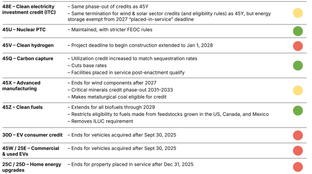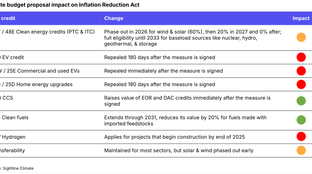
🌎 Bright spots and sunsets in the OBBB #253
One Big Beautiful Bill ushers in new (and old) energy agenda
Plus, the pros / cons of climate tech crowdfunding and syndicates
Happy Monday!
It was a quieter week in climate tech, despite some potential regulatory excitement from a new Biden climate plan trying to bridge the Green New Deal with existing centrist infrastructural aims. We’ve been having conversations with folks around approaches and merits to individual investment in climate tech, with a particular focus on the role of syndicates and crowdfunding. These pieces – coupled with deal news, jobs, and a (questionably) reduced-methane Whopper brought to you by the yodeling kid – round out our issue.
Thanks for reading!
Not a subscriber yet?
Joe Biden has outlined a much more aggressive climate plan – proposing to spend $2 trillion over four years to boost clean energy and rebuild infrastructure. Before the pandemic, Biden’s climate and energy plan sought to invest $1.7 trillion over 10 years.
The Democratic nominee’s new commitments, which include a 100% clean energy standard by 2035, mark a shift toward progressives’ climate priorities, such as cutting fossil fuel emissions.
Biden’s website states these as the key components of his plan:
Why does this matter?
How does this impact climate tech?
How does this relate to recent House Dem bills and the Green New Deal?

🥛 Oatly, a Sweden-based oat milk producer, raised $200m in growth equity funding from The Blackstone Group, Howard Schultz, Oprah Winfrey, Roc Nation, Natalie Portman, Orkila Capital, and Rabo Corporate Investments. TechCrunch has more here.
🌾 Growers Edge, a Johnston, Iowa-based fintech startup focused on agriculture, raised $49m in Series B funding from S2G Ventures, Cox Enterprises, and Skyline Global Partners. The company designs warranty-backed crop management plans which reduce farmer’s risk and promote more efficient crop yield. More here.
🛴 Voi Technology, a Sweden-based electric scooter company, raised $30m in new funding led by VNV Global, along with 20 earlier investors. The startup plans to use the funding to expand into new markets, including the UK. More here.
🌲 Komaza, a Kenya-based company focused on sustainable forestry, raised $28m in Series B funding from AXA Impact Fund, Novastar Ventures, FMO, and Mirova. The startup is building a “virtual plantation” which connects small-scale farmers to tackle the wood supply crisis. More here.
🚗 GoTo Global, an Israel-based vehicle sharing tech platform mobility, raised $19m in Series B funding from WeWork cofounder Adam Neumann and Shagrir Group Vehicle Services. The company offers shared mobility-as-a-service and enables users to book share cars, electric scooters, bikes, and mopeds through a single app in 13 cities worldwide. TechCrunch has more here.
🍎 Crisp, a New York-based demand forecasting software for the food industry, raised $12m in Series A funding from FirstMark Capital, Spring Capital, and Swell Capital. The company provides data analysis for food suppliers and distributors which predicts trends and demand in order to increase revenue and decrease food waste. TechCrunch has more here.
🍎 Mori (previously Cambridge Crops), a Boston, MA-based company using silkworm cocoons as food preservatives, raised $12m in Series A funding from Acre Venture Partners, Prelude Ventures, Grantham Environmental Trust, The Engine, Refactor Capital, Closed Loop Partners, Blindspot Ventures, and The Fink Family Foundation. More here.
🛴 Swiftmile, a San Mateo, CA-based startup providing micromobility parking and charging stations, has raised $5m in funding from Thayer Ventures, Verizon Ventures, Alumni Ventures Groups, and WSGR. TechCrunch has more here.
🐷 Karana, a Singapore-based plant-based meat producer, raised $1.7m in Seed Funding from Big Idea Ventures, Germi8, and several individual investors. The company has created a pork substitute made from jackfruit sourced from smallholder farmers in Sri Lanka. TechCrunch has more here.
🛰️ Blue Sky Analytics, an India-based geospatial data intelligence startup, raised $1.2m in funding from Bennett, Rainmatter Capita, and Stanford Angels & Entrepreneurs. The company is building AI-powered infrastructure for environmental monitoring and precise climate risk assessment. More here.
🔋 Circulor, a London-based supply chain traceability startup, has raised an undisclosed amount from Volvo’s VC arm. The company uses blockchain and AI to trace materials such as those used in electric car batteries. More here.
Li Auto, a Beijing, China-based maker of electric SUVs, filed for an $100 million IPO posting revenue of $40m in 2019 and a loss of $463m. It plans to list on the Nasdaq as “LI.” More here.
KKR invested in GreenCollar, an Australian environmental markets platform which works with farmers and land managers to develop carbon and reef credit projects. More here.
Today, climate tech investment is still relatively nascent and specialized; the knowledge of what technologies will work and what markets will price is evolving in an era of regulatory, scientific, and methodological uncertainty. There’s the lasting memory of the bust of Cleantech 1.0 and present relative immaturity of climate models and measurement (carbon offset pricing, data on basic GHG tracking).
Given the above, there’s a discount against slower, heavy, generic capital and a bias towards money with an edge of understanding or influence.
For aspiring climate tech individual investors, that means trending toward newer, nimbler, forms of capitalization: (1) crowdfunding and (2) syndicates. Crowdfunding raises small amounts of money from a high quantity of people (think of Kickstarter or Indiegogo). Syndicates are vehicles of experienced angel investors who pool their capital together to make investments. Historically, these methods were not available to non-accredited (read: non-high net worth, non-professional) investors; though that’s opened up over the last few years due to JOBS Act legislation and reduced legal and regulatory burdens.
Climate tech is uniquely positioned here. Like the Silicon tinkerers of Valley lore, the answers to problems that haven’t been solved or seen before likely won’t come from venture or institutional capital pattern matching to what has been successful (because few things have been). That said, both approaches have their roses and thorns, and both rely on investing the time to understand the facets of climate and actively bet on the quality of that understanding.
Crowdfunding -
Pros:
Promotes mix of customer validation and working capital that can refresh depending on milestones
Geared toward consumer products (‘kickstarting’ food & beverages, gadgets) that require loyalty and a prioritization of features that don’t yet exist
Direct access to pain points and promotion of jobs that need to be done, less time spent determining potential market readiness
Cons:
Reduced diligence potential, limited regulation around reporting and visibility
Reduced upside for individual financial return, reduced ownership or stake in shaping product / company trajectory
Fees and distracting mediation costs
Syndicates -
Pros:
Potential to bring together disparate expertise and influence to shape company and product trajectory (e.g. those that know, and who are in the know)
Flexibility in check size and other edge in surfacing and vetting off-market opportunities before the market or larger later investors scoop
Ability to influence company trajectory through operational, partnerships, and talent support on a direct level
Cons:
Following the leader element, deal-by-deal asymmetry of trust with syndicate champion
Differing fees, biases, and ‘small N’ challenges or quality of who you know and who they know
Limits of scale and timelines to return, competing liquidity preferences and abilities to support different risk thresholds
On net, given the risk profile of climate tech as a category, most individual investors will be inherently marrying the quality of their non-investment livelihoods with the quality of their trades. While day trading Tesla won’t capture the excitement and returns of the maturation of the category, pioneer investments whether through syndicates or crowdfunding will propel the ecosystem to be more ready to take on traditional capital over time. All investments are uncertain, but marrying your individual, differentiated perspective on a product or service will depend on the quality of that perspective, the quality of those that share it, and the ability to make it viral.
Over time, we’ll be sharing more of these opportunities and individual deals as we see them, and are excited to continue conversations with those looking to expand the conversation here.
Bloomberg: Members of the Oil & Gas Climate Initiative which includes Saudi Aramco has pledged to reduce their carbon intensity between 20-21 kg of CO2 per barrel of crude equivalent by 2025 (representing a 13% reduction from 2017 levels). The pledge doesn’t include Scope 3 emissions, and specifically leaves out reducing emissions overall but rather oil being cleaner on a per-barrel basis. However, achieving the target by 2025 would still remove as much as ~52m tons of CO2 per year.
ClimateTRACE: Nine organizations announced a new initiative, focused on AI, satellite image processing, remote sensing and machine learning. The project, named ClimateTRACE (Tracking Real-time Atmospheric Carbon Emissions), aims to independently detect emissions and where they’re coming from in real time. ClimateTRACE has set a goal of releasing a full emissions report and visualisation before COP26 Glasgow in 2021.
Greentown Labs: Leading cleantech innovation orgs, Urban Future Lab, Fraunhofer, and Greentown Labs, teamed up to launch the Carbon to Value Initiative (C2V) with the intent to “unlock a new carbontech economy.” The 3-year initiative will connect early ventures with chemical, materials, and energy industry leaders to commercialize the carbon-to-value market.
Amazon: The We Mean Business coalition, a global group 1,200 businesses dedicated to accelerating the transition to a zero-carbon economy, just partnered with the world’s largest company to “pick up the pace” through The Climate Pledge to reach the Paris Agreement 10 years ahead of schedule.
Air Products: Saudi renewables company, ACWA, committed to build a wind and solar farm from which all 4 GW of electricity will be used to produce hydrogen to be used in overseas hydrogen powered vehicles. Interestingly, American industrial giant Air Products funded the $2bn investment, with the electrolysers to be made by ThyssenKrupp. A truly international partnership, this is by far the largest renewables+hydrogen project and is slated for completion in just 5 years.
Nature: On the coattails of the recent surge in excitement around the potential of carbon capture and sequestration through the enhanced weathering of olivine, a paper from a team of UK biogeochemists proves similar sequestration potential from the spreading of ground basalt on agricultural land.
House Appropriations Committee: The House Appropriations Committee released its fiscal 2021 Energy and Water Development Funding Bill investing $49.6 billion in programs to address climate change, improve infrastructure, and uphold the commitment to strengthening national security.
GreenBiz: SASB and GRI, two powerhouses in ESG standards, have joined forces in an effort to ease confusion in the crowded field of sustainability disclosure standards. The collaboration will focus mainly around building more complementary dialogue for the marketplace, and providing examples of how organizations have used both standards in harmony to their benefit.
Exelon Foundation selected 10 startups for its $20m Climate Change Investment Initiative. Of the startups, 50% are minority- or women-owned businesses, 60% are focused on greenhouse gas mitigation, and 40% are addressing resiliency and adaptation. More here.
Omniago is a knowledge base using crowdsourcing to bring the best information on various climate topics together for easier learning and sharing.
Climate Careers has rebranded into ClimateBase and offers a discovery platform for jobs, organizations & events. Check it out on Product Hunt.
Burger King is introducing a “Reduced Methane Emissions” whopper, adding lemon grass to cows’ diets which can reduce methane emissions by ~30% (announced by the yodeling kid).
[Event] Bypassing Fossil Fuels to Produce “Green” Hydrogen: Join on July 22 from 6-8pm PT to hear about two novel methods to produce “green” hydrogen that leverages renewable feedstocks and results in zero emissions.
[Event] It’s Time to Talk About Climate Change: Join on July 23 from 12-2pm PT to learn about how to discuss and think about the climate crisis.
[Opportunity] Huhtamaki Circular Economy:Apply by August 15 for an 11-week program focused on innovative circular economy startups.
Feel free to send us new ideas, recent fundings, or general curiosities. Have a great week ahead!

One Big Beautiful Bill ushers in new (and old) energy agenda

Climate, capital, and carrots in London's new playbook

US plays popcorn politics with biofuels and beyond